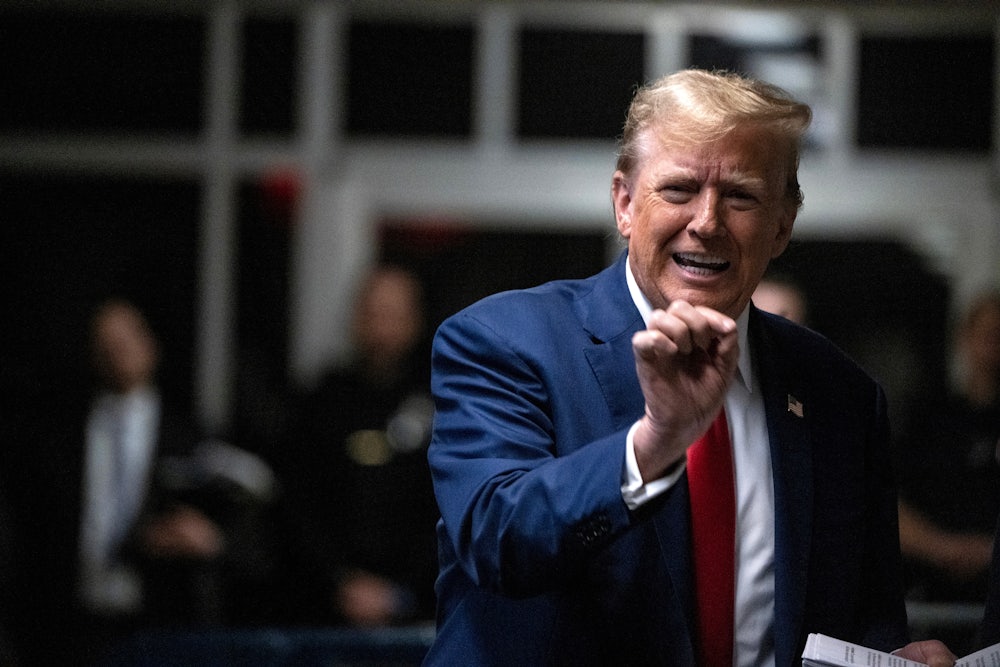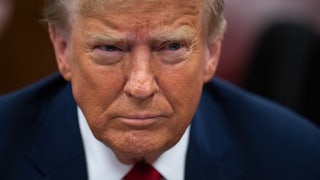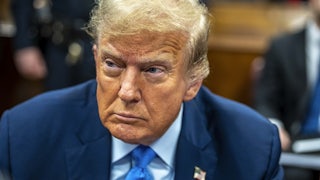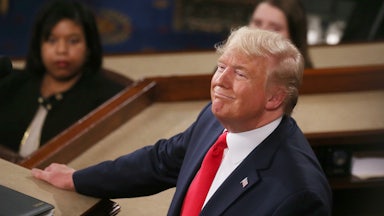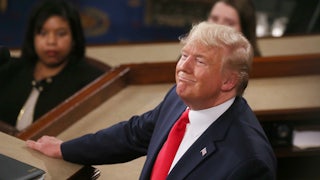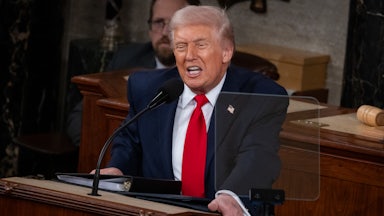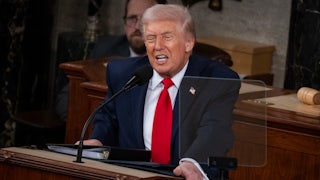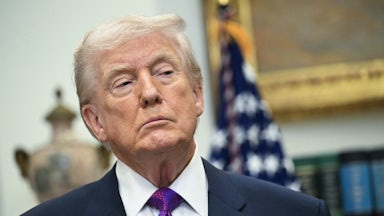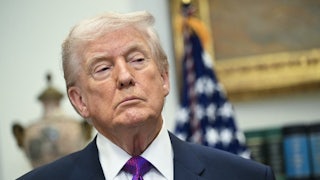Former President Donald Trump sat through an excruciating week of testimony in his New York trial on fraud charges over his payments to porn star Stormy Daniels in 2016. Beyond the Big Apple, however, things are looking rosier for him on the legal front. The former president is facing four separate criminal prosecutions at the moment, including the New York one. The other three are in varying degrees of jeopardy.
The Georgia case previously appeared to be the most formidable legal threat that Trump would face. There was ample evidence that Trump had tried to corrupt the state’s election process in 2020, including his infamous request for then-Secretary of State Brad Raffensperger to “find” enough votes to give him a lead in the state. As a state-level prosecution, Trump also could not simply pardon or purge himself out of it if he won in November.
But things went awry in January when one of Trump’s co-defendants asked Judge Scott McAfee to dismiss the case because of a potential conflict of interest among the prosecutors. They alleged that Fani Willis, the Fulton County district attorney, had a romantic relationship with Nathan Wade, a special prosecutor she had hired for the case. That relationship, they alleged, included taking expensive vacations while Wade was under contract with the district attorney’s office.
Willis later acknowledged that she and Wade had a “personal relationship” in court filings, but argued that it did not justify her removal from the case. McAfee held a hearing on the matter in February and ultimately concluded in March that the relationship did create the “appearance of conflict.” But he also ruled that the problem could be fixed if Wade stepped down from the case, which he promptly did.
Trump and the other co-defendants appealed that ruling to the Georgia Court of Appeals. The court agreed this week to consider it. McAfee has indicated in court filings that he intends to continue on the path to trial while that appeal unfolds, but the appeals court may later decide to delay the case while it considers the matter.
Both of special counsel Jack Smith’s cases are also in danger. In D.C., he charged Trump with multiple offenses over his efforts to obstruct the electoral vote count on January 6, 2021. That case was originally scheduled to go to trial on March 4. But the Supreme Court’s decision in late February to take up an appeal from Trump on whether he has “presidential immunity” threw a wrench into things.
Trump had argued, as he always does, that prosecutors couldn’t charge him with any of the offenses he faced. This time, his excuse was that his acts on and before January 6, 2021 couldn’t be prosecuted because presidents are generally immune from criminal prosecution for their official conduct. There is no history or precedent of presidential immunity in America, so both the trial court and the D.C. Circuit Court of Appeals firmly rejected it.
Enter the Supreme Court. The justices turned down an earlier opportunity to hear the case after the trial judge rejected Trump’s immunity arguments in December. After the D.C. circuit ruled against Trump, the former president tried again. This time, the justices granted review and scheduled oral arguments for April 25, all but guaranteeing that a trial couldn’t begin and end before the November election.
What’s more, at oral arguments last month, most of the conservative justices appeared willing to embrace some of immunity arguments, potentially jeopardizing the entire case. While it’s possible that the court’s final opinion will allow some of the charges to proceed, that the court could embrace the idea that the president can commit some crimes without consequence is a frightening one.
And while one of Smith’s cases is in peril, the other—a case involving stolen classified documents in Florida—is essentially a lost cause. In an order earlier this week, Judge Aileen Cannon canceled the scheduled May 20 trial date and declined to schedule a new one. Canceling the May 20 trial date was not a surprise, given the volume of pre-trial motions left to be decided. (More on that in a bit.) But her decision not to schedule a new date is a sign that it won’t even come close to happening before the November election.
Cannon wrote that setting a trial date “would be imprudent and inconsistent with the court’s duty to fully and fairly consider the various pending pretrial motions before the court, critical CIPA issues, and additional pretrial and trial preparations necessary to present this case to a jury,” referring to the Classified Information Procedures Act, a federal law that governs how classified material can be used in criminal trials.
Some of Cannon’s sluggishness might be charitably attributed to her lack of experience. The 41-year-old judge, who was confirmed to the bench in 2020, had only overseen four criminal trials prior to being assigned to Trump’s case last year. Criminal trials that involve national security matters or classified documents are also inherently more complex than the average federal case, with both sides often wrangling intensely over what can be disclosed to the jury and to the public.
That may explain why so many pretrial motions have piled up before the court. It does not help that Trump has a tendency to file meritless legal arguments over and over again in an apparent bid to clog up and delay the process. A more experienced judge might dispose of these motions in writing and without hearings, but Cannon has opted to let them accumulate and hold unnecessary hearings on the frivolous ones.
But the real problem appears to be Cannon herself. It is hard to avoid the impression that she is engineering things for Trump’s benefit. Her first intervention in the classified documents case came in September 2022, when she effectively suspended the Justice Department’s investigation after it carried out a search warrant at Mar-a-Lago at Trump’s request. Cannon’s move at Trump’s request was deeply flawed on both statutory and constitutional grounds. Unsurprisingly, the Eleventh Circuit Court of Appeals overturned her ruling a few months later and not so subtly chastised Cannon.
Things did not improve once Cannon was assigned as the trial judge either. In March, for example, Cannon issued an extremely unusual order for the prosecution and the defense to craft jury instructions based around Trump’s claims on the Presidential Records Act. That incident bewildered legal experts for two reasons. First, it centered on fundamental misreadings of the PRA and how it applied to the classified records in Trump’s case. Second, and just as troublingly, it prioritized jury instructions over more pressing pretrial matters that were already pending on her docket.
The special counsel’s office has few tools to address the situation. Federal judges have a lot of discretion in how to run criminal trials in their courtrooms. Cannon is using that discretion—in ways that work to Trump’s advantage. By dragging things out without handing Trump a major substantive win, she has carefully avoided doing anything that might give the special counsel’s office grounds to appeal something to the Eleventh Circuit.
Perhaps the most telling indicator of Cannon’s bias is how Trump himself talks about her. The former president is never shy about criticizing judges in public, at times even dragging their family members into things. His criticism was so vehement while in office that Chief Justice John Roberts took the extraordinary step of publicly rebuking it. With Cannon, Trump has nothing but praise. He even suggested that Smith be punished for criticizing one of Cannon’s orders last month.
“[Smith] should be sanctioned or censured for the way he is attacking a highly respected Judge, Aileen Cannon, who is presiding over his FAKE Documents Hoax case in Florida,” Trump wrote on his personal social media website. “He is a lowlife who is nasty, rude, and condescending, and obviously trying to ‘play the ref.’”
If there’s anyone who knows what it’s like to “play the ref,” of course, it’s Trump. Thanks to the missteps of his prosecutors, the gullibility of his judges, and the delay tactics of his lawyers, he may not face consequences in three out of the four criminal trials he faces before the presidential election in November. Even if he is defeated again, the legal system’s failure to hold him accountable for the last four years will be a dismal sign for the rule of law in America.
